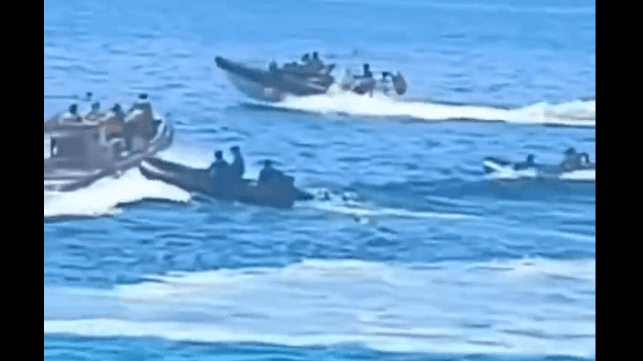Report: China Coast Guard Stole Two Philippine Boats, Dumped Cargo

The altercation between Chinese and Philippine forces at Second Thomas Shoal earlier this week was much more serious than previously reported, officials in Manila acknowledged on Tuesday.
The Philippine armed forces have confirmed that a Filipino soldier had been severely injured when a China Coast Guard boat carried out an "intentional high-speed ramming" at Second Thomas Shoal early Monday morning. In an update Tuesday, two Philippine officials quietly acknowledged that at least eight soldiers were injured, including one who was seriously injured - and that the China Coast Guard towed off two Philippine Navy rubber boats.
According to the AP, two Philippine Navy boats were ferrying supplies to the outpost aboard the grounded landing ship BRP Sierra Madre when they were intercepted by several China Coast Guard speedboats. An altercation ensued, involving a "scuffle" and several collisions. In the fray, a Philippine servicemember lost a thumb, two officials told AP on condition of anonymity.
Contrary to previous formal statements, the officials said that the Philippine Coast Guard was present at the scene and moved in to rescue the injured personnel.
After the encounter, the China Coast Guard towed off the two rubber boats, dumped the contents over the side - including firearms - and abandoned them. Philippine Navy forces later recovered the boats, but not all of the cargo.
If the new account is accurate, the run-in is by far the most serious incident yet at Second Thomas Shoal, a contested flashpoint claimed by China and occupied by the Philippines (with international diplomatic and legal recognition). China has accused the Philippines of starting Monday's confrontation, alleging that Philippine vessels "dangerously approached a Chinese vessel in normal navigation in an unprofessional manner, resulting in a collision."
The AFP blamed the China Coast Guard for the incident and demanded de-escalation from the Chinese side.
"The CCG’s continued aggressive behavior and unprofessional conduct towards a legitimate humanitarian mission is unacceptable. They must restrain themselves to avoid escalating tensions," the Armed Forces of the Philippines said in a statement Tuesday evening.
The U.S. Department of State affirmed America's continued support of Philippine sovereignty and security, as guaranteed by the U.S.-Philippine Mutual Defense Treaty. Deputy Secretary of State Kurt Campbell reiterated that the treaty covers "armed attacks on Philippine armed forces . . . anywhere in the South China Sea."
Fears of Chinese activity off Luzon
Separately, local fishermen on the west coast of Luzon told Philippine outlet GMA that they spotted a suspected Chinese vessel within 20 nautical miles of the nation's main island - far closer in than Chinese forces normally venture.
"Last week we really saw [them] - they also disappeared so fast but it was scary," one fisherman told GMA.
Local residents are aware of the China Coast Guard's newly-enacted rules of engagement, which allow the CCG to arrest anyone suspected of breaking Chinese law in the Philippine exclusive economic zone. The measure allows the CCG to detain suspects for up to 60 days without charges. As a precaution, some fishermen are staying away from their traditional fishing grounds at Scarborough Shoal, a reef off Luzon that has been occupied by Chinese forces for 10 years.
"Maybe we will be caught and taken to China, so we will just be patient," Jeffrey Elad, President of the Tropical Fish Gatherer Association, told GMA.
U.S. Marine Corps carries out shore battery exercises on Luzon

that matters most
Get the latest maritime news delivered to your inbox daily.
On Monday, I Marine Expeditionary Force announced that a joint U.S. and Philippine force carried out a live-fire event off the coast of Cape Bojeador, on the northeast corner of Luzon. U.S. Marine Corps units provided coordination, and the Philippine Marine Corps (PMC) carried out artillery strikes on "staged maritime targets" about four miles offshore.
In an area just to the south, four U.S. Marine Corps F-35 fighters out of Clark Air Force Base conducted strikes on practice targets about three miles offshore. "The areas utilized for the littoral live-fire events were within Philippine territorial waters and stringent safety precautions were taken to ensure safe and responsible training execution," the Marine Corps said in a statement.
